Examining the Link: Neoliberalism, Ideology, and Corporate Crime
VerifiedAdded on 2023/03/30
|10
|2206
|111
Essay
AI Summary
This essay delves into the intricate relationship between neoliberal ideology and corporate crime, arguing that the former creates an environment conducive to the latter. It defines neoliberalism as a policy model that favors free-market capitalism, reduced government regulation, and privatization, leading to a concentration of power and wealth in transnational corporations. The essay then explores how neoliberal policies, such as shock therapy, can create opportunities for corruption by weakening regulatory controls and fostering a culture of self-interest over ethical considerations. It examines the concept of corporate corruption, highlighting how the pursuit of private wealth accumulation can conflict with the rule of law. The paper uses the Iraq case as an example, illustrating how neoliberal policies can facilitate corporate crime on a large scale. The essay concludes by emphasizing the need for a balance between free enterprise and adherence to the rule of law in capitalist societies to prevent corporate malfeasance.
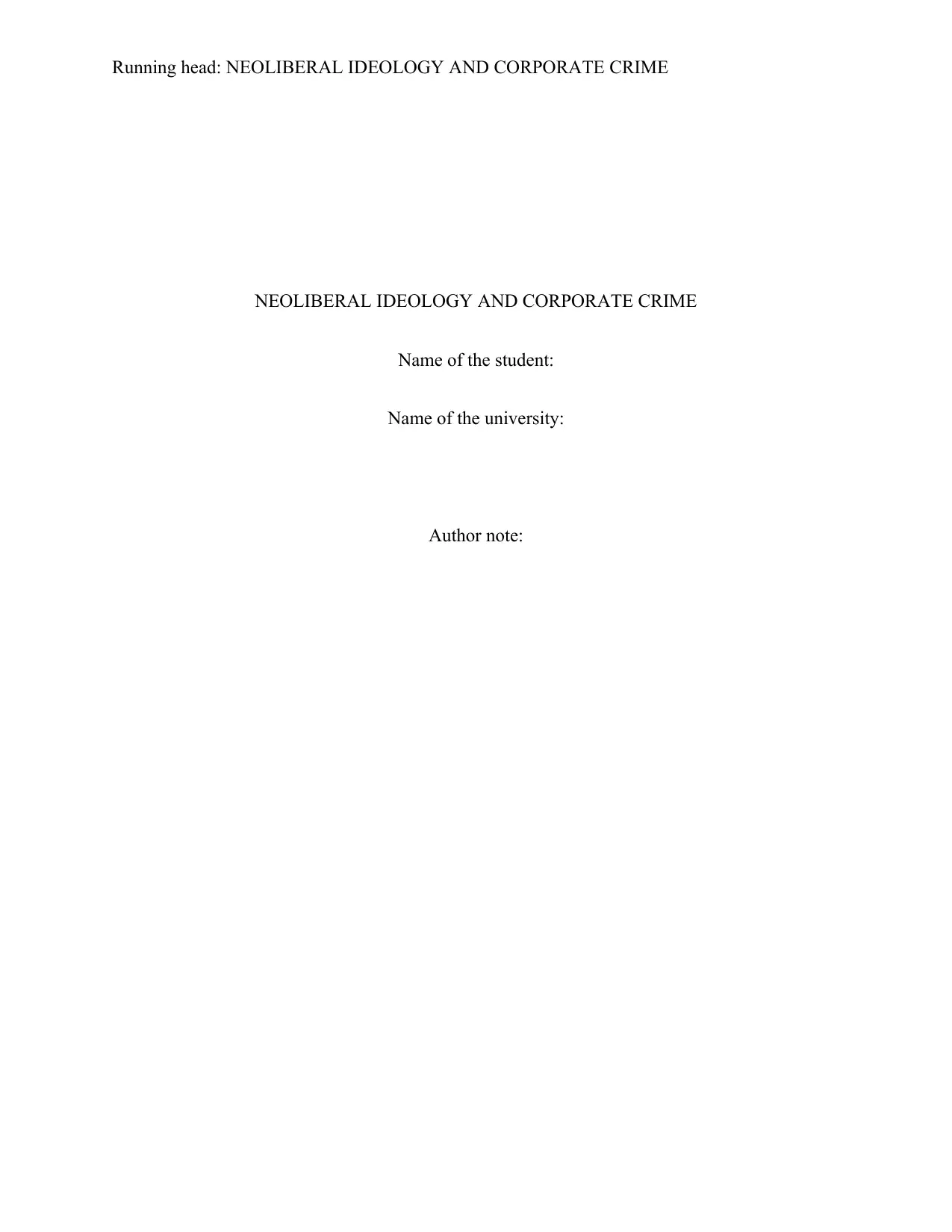
Running head: NEOLIBERAL IDEOLOGY AND CORPORATE CRIME
NEOLIBERAL IDEOLOGY AND CORPORATE CRIME
Name of the student:
Name of the university:
Author note:
NEOLIBERAL IDEOLOGY AND CORPORATE CRIME
Name of the student:
Name of the university:
Author note:
Paraphrase This Document
Need a fresh take? Get an instant paraphrase of this document with our AI Paraphraser
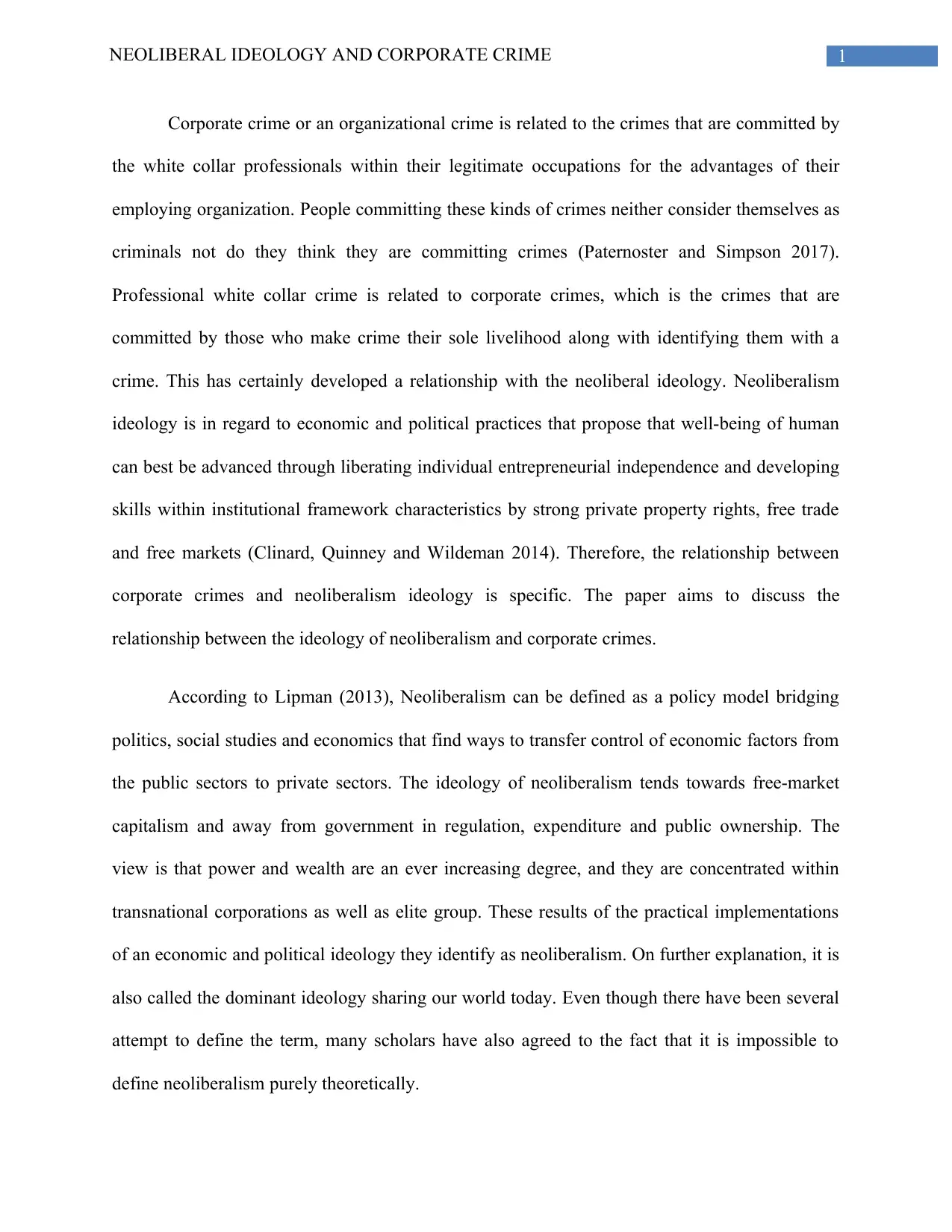
1NEOLIBERAL IDEOLOGY AND CORPORATE CRIME
Corporate crime or an organizational crime is related to the crimes that are committed by
the white collar professionals within their legitimate occupations for the advantages of their
employing organization. People committing these kinds of crimes neither consider themselves as
criminals not do they think they are committing crimes (Paternoster and Simpson 2017).
Professional white collar crime is related to corporate crimes, which is the crimes that are
committed by those who make crime their sole livelihood along with identifying them with a
crime. This has certainly developed a relationship with the neoliberal ideology. Neoliberalism
ideology is in regard to economic and political practices that propose that well-being of human
can best be advanced through liberating individual entrepreneurial independence and developing
skills within institutional framework characteristics by strong private property rights, free trade
and free markets (Clinard, Quinney and Wildeman 2014). Therefore, the relationship between
corporate crimes and neoliberalism ideology is specific. The paper aims to discuss the
relationship between the ideology of neoliberalism and corporate crimes.
According to Lipman (2013), Neoliberalism can be defined as a policy model bridging
politics, social studies and economics that find ways to transfer control of economic factors from
the public sectors to private sectors. The ideology of neoliberalism tends towards free-market
capitalism and away from government in regulation, expenditure and public ownership. The
view is that power and wealth are an ever increasing degree, and they are concentrated within
transnational corporations as well as elite group. These results of the practical implementations
of an economic and political ideology they identify as neoliberalism. On further explanation, it is
also called the dominant ideology sharing our world today. Even though there have been several
attempt to define the term, many scholars have also agreed to the fact that it is impossible to
define neoliberalism purely theoretically.
Corporate crime or an organizational crime is related to the crimes that are committed by
the white collar professionals within their legitimate occupations for the advantages of their
employing organization. People committing these kinds of crimes neither consider themselves as
criminals not do they think they are committing crimes (Paternoster and Simpson 2017).
Professional white collar crime is related to corporate crimes, which is the crimes that are
committed by those who make crime their sole livelihood along with identifying them with a
crime. This has certainly developed a relationship with the neoliberal ideology. Neoliberalism
ideology is in regard to economic and political practices that propose that well-being of human
can best be advanced through liberating individual entrepreneurial independence and developing
skills within institutional framework characteristics by strong private property rights, free trade
and free markets (Clinard, Quinney and Wildeman 2014). Therefore, the relationship between
corporate crimes and neoliberalism ideology is specific. The paper aims to discuss the
relationship between the ideology of neoliberalism and corporate crimes.
According to Lipman (2013), Neoliberalism can be defined as a policy model bridging
politics, social studies and economics that find ways to transfer control of economic factors from
the public sectors to private sectors. The ideology of neoliberalism tends towards free-market
capitalism and away from government in regulation, expenditure and public ownership. The
view is that power and wealth are an ever increasing degree, and they are concentrated within
transnational corporations as well as elite group. These results of the practical implementations
of an economic and political ideology they identify as neoliberalism. On further explanation, it is
also called the dominant ideology sharing our world today. Even though there have been several
attempt to define the term, many scholars have also agreed to the fact that it is impossible to
define neoliberalism purely theoretically.
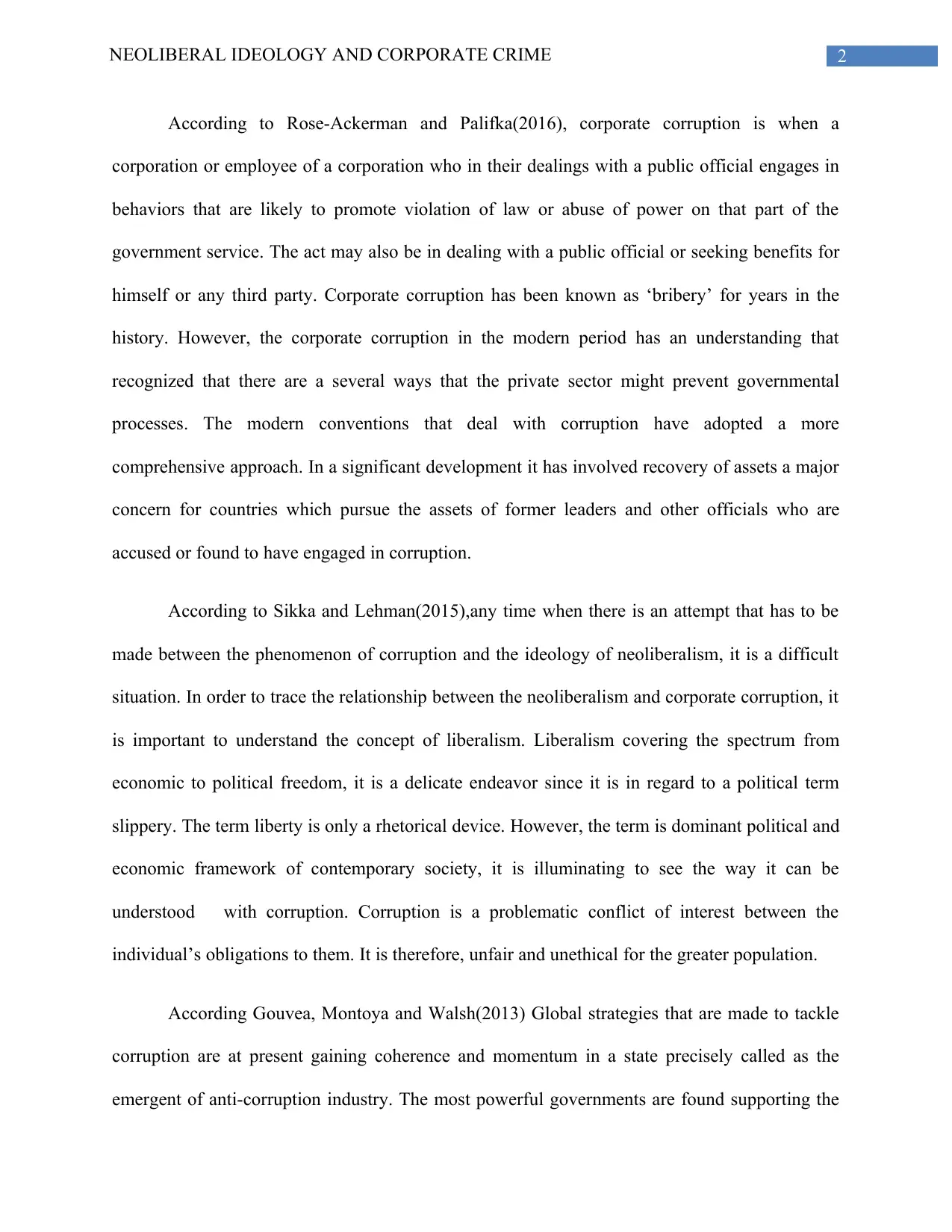
2NEOLIBERAL IDEOLOGY AND CORPORATE CRIME
According to Rose-Ackerman and Palifka(2016), corporate corruption is when a
corporation or employee of a corporation who in their dealings with a public official engages in
behaviors that are likely to promote violation of law or abuse of power on that part of the
government service. The act may also be in dealing with a public official or seeking benefits for
himself or any third party. Corporate corruption has been known as ‘bribery’ for years in the
history. However, the corporate corruption in the modern period has an understanding that
recognized that there are a several ways that the private sector might prevent governmental
processes. The modern conventions that deal with corruption have adopted a more
comprehensive approach. In a significant development it has involved recovery of assets a major
concern for countries which pursue the assets of former leaders and other officials who are
accused or found to have engaged in corruption.
According to Sikka and Lehman(2015),any time when there is an attempt that has to be
made between the phenomenon of corruption and the ideology of neoliberalism, it is a difficult
situation. In order to trace the relationship between the neoliberalism and corporate corruption, it
is important to understand the concept of liberalism. Liberalism covering the spectrum from
economic to political freedom, it is a delicate endeavor since it is in regard to a political term
slippery. The term liberty is only a rhetorical device. However, the term is dominant political and
economic framework of contemporary society, it is illuminating to see the way it can be
understood with corruption. Corruption is a problematic conflict of interest between the
individual’s obligations to them. It is therefore, unfair and unethical for the greater population.
According Gouvea, Montoya and Walsh(2013) Global strategies that are made to tackle
corruption are at present gaining coherence and momentum in a state precisely called as the
emergent of anti-corruption industry. The most powerful governments are found supporting the
According to Rose-Ackerman and Palifka(2016), corporate corruption is when a
corporation or employee of a corporation who in their dealings with a public official engages in
behaviors that are likely to promote violation of law or abuse of power on that part of the
government service. The act may also be in dealing with a public official or seeking benefits for
himself or any third party. Corporate corruption has been known as ‘bribery’ for years in the
history. However, the corporate corruption in the modern period has an understanding that
recognized that there are a several ways that the private sector might prevent governmental
processes. The modern conventions that deal with corruption have adopted a more
comprehensive approach. In a significant development it has involved recovery of assets a major
concern for countries which pursue the assets of former leaders and other officials who are
accused or found to have engaged in corruption.
According to Sikka and Lehman(2015),any time when there is an attempt that has to be
made between the phenomenon of corruption and the ideology of neoliberalism, it is a difficult
situation. In order to trace the relationship between the neoliberalism and corporate corruption, it
is important to understand the concept of liberalism. Liberalism covering the spectrum from
economic to political freedom, it is a delicate endeavor since it is in regard to a political term
slippery. The term liberty is only a rhetorical device. However, the term is dominant political and
economic framework of contemporary society, it is illuminating to see the way it can be
understood with corruption. Corruption is a problematic conflict of interest between the
individual’s obligations to them. It is therefore, unfair and unethical for the greater population.
According Gouvea, Montoya and Walsh(2013) Global strategies that are made to tackle
corruption are at present gaining coherence and momentum in a state precisely called as the
emergent of anti-corruption industry. The most powerful governments are found supporting the
⊘ This is a preview!⊘
Do you want full access?
Subscribe today to unlock all pages.

Trusted by 1+ million students worldwide
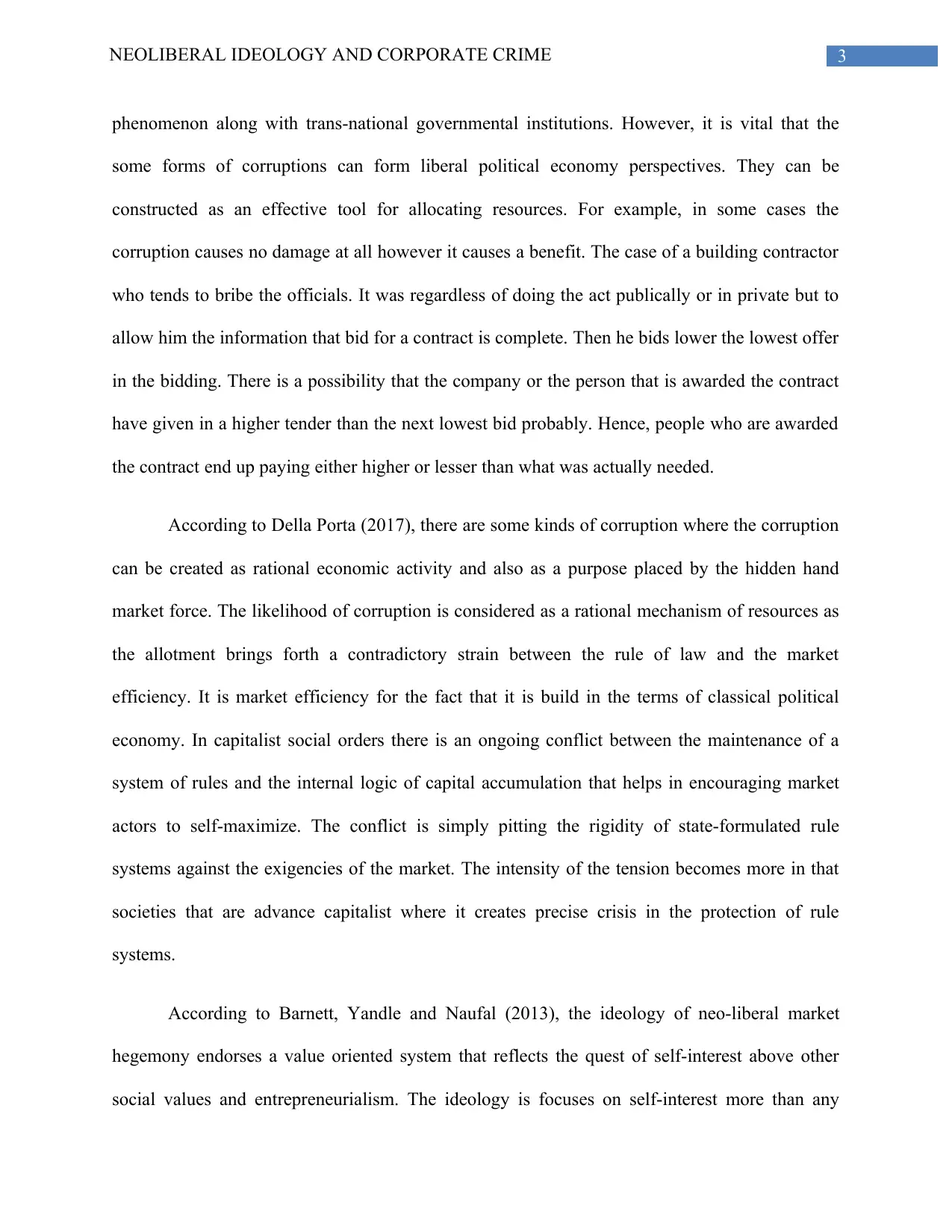
3NEOLIBERAL IDEOLOGY AND CORPORATE CRIME
phenomenon along with trans-national governmental institutions. However, it is vital that the
some forms of corruptions can form liberal political economy perspectives. They can be
constructed as an effective tool for allocating resources. For example, in some cases the
corruption causes no damage at all however it causes a benefit. The case of a building contractor
who tends to bribe the officials. It was regardless of doing the act publically or in private but to
allow him the information that bid for a contract is complete. Then he bids lower the lowest offer
in the bidding. There is a possibility that the company or the person that is awarded the contract
have given in a higher tender than the next lowest bid probably. Hence, people who are awarded
the contract end up paying either higher or lesser than what was actually needed.
According to Della Porta (2017), there are some kinds of corruption where the corruption
can be created as rational economic activity and also as a purpose placed by the hidden hand
market force. The likelihood of corruption is considered as a rational mechanism of resources as
the allotment brings forth a contradictory strain between the rule of law and the market
efficiency. It is market efficiency for the fact that it is build in the terms of classical political
economy. In capitalist social orders there is an ongoing conflict between the maintenance of a
system of rules and the internal logic of capital accumulation that helps in encouraging market
actors to self-maximize. The conflict is simply pitting the rigidity of state-formulated rule
systems against the exigencies of the market. The intensity of the tension becomes more in that
societies that are advance capitalist where it creates precise crisis in the protection of rule
systems.
According to Barnett, Yandle and Naufal (2013), the ideology of neo-liberal market
hegemony endorses a value oriented system that reflects the quest of self-interest above other
social values and entrepreneurialism. The ideology is focuses on self-interest more than any
phenomenon along with trans-national governmental institutions. However, it is vital that the
some forms of corruptions can form liberal political economy perspectives. They can be
constructed as an effective tool for allocating resources. For example, in some cases the
corruption causes no damage at all however it causes a benefit. The case of a building contractor
who tends to bribe the officials. It was regardless of doing the act publically or in private but to
allow him the information that bid for a contract is complete. Then he bids lower the lowest offer
in the bidding. There is a possibility that the company or the person that is awarded the contract
have given in a higher tender than the next lowest bid probably. Hence, people who are awarded
the contract end up paying either higher or lesser than what was actually needed.
According to Della Porta (2017), there are some kinds of corruption where the corruption
can be created as rational economic activity and also as a purpose placed by the hidden hand
market force. The likelihood of corruption is considered as a rational mechanism of resources as
the allotment brings forth a contradictory strain between the rule of law and the market
efficiency. It is market efficiency for the fact that it is build in the terms of classical political
economy. In capitalist social orders there is an ongoing conflict between the maintenance of a
system of rules and the internal logic of capital accumulation that helps in encouraging market
actors to self-maximize. The conflict is simply pitting the rigidity of state-formulated rule
systems against the exigencies of the market. The intensity of the tension becomes more in that
societies that are advance capitalist where it creates precise crisis in the protection of rule
systems.
According to Barnett, Yandle and Naufal (2013), the ideology of neo-liberal market
hegemony endorses a value oriented system that reflects the quest of self-interest above other
social values and entrepreneurialism. The ideology is focuses on self-interest more than any
Paraphrase This Document
Need a fresh take? Get an instant paraphrase of this document with our AI Paraphraser
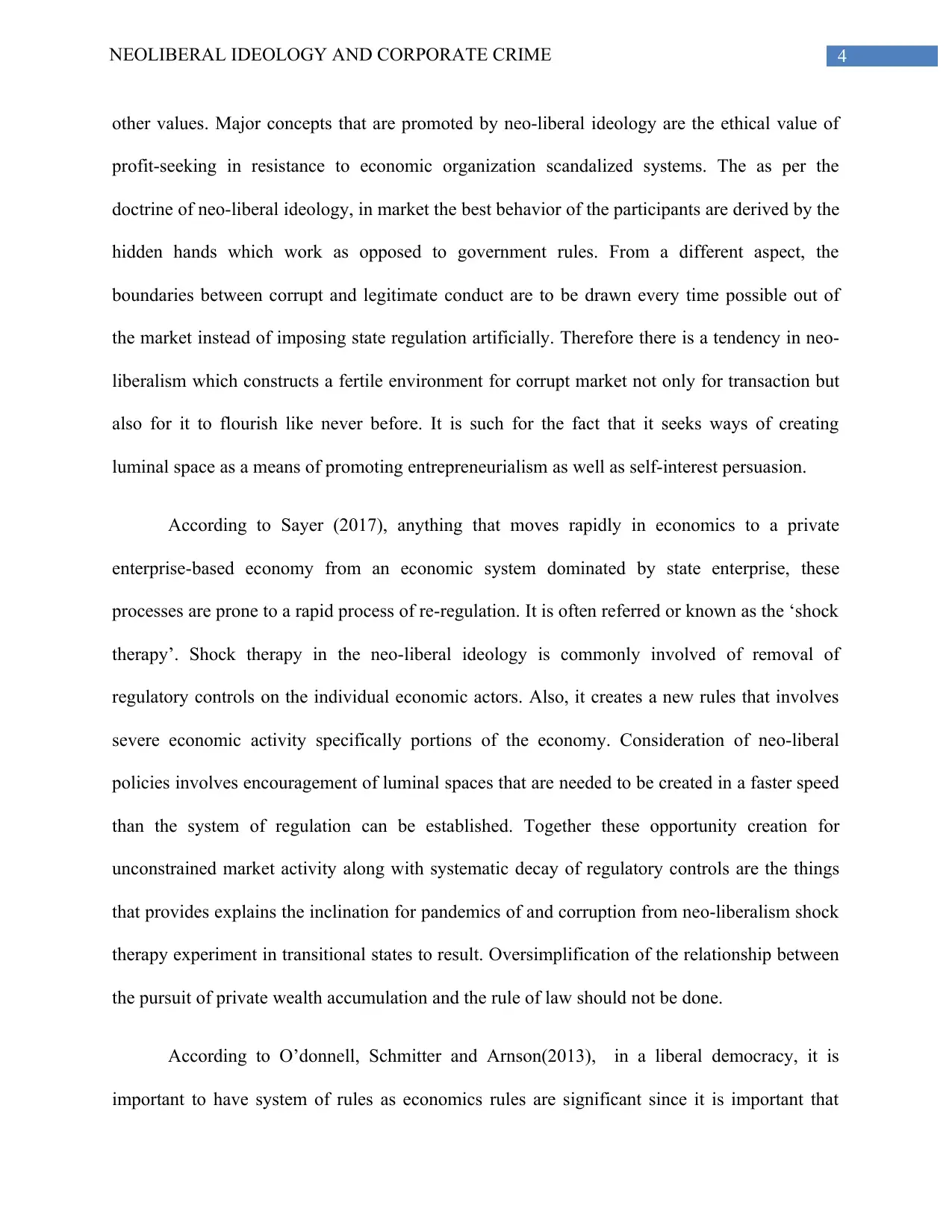
4NEOLIBERAL IDEOLOGY AND CORPORATE CRIME
other values. Major concepts that are promoted by neo-liberal ideology are the ethical value of
profit-seeking in resistance to economic organization scandalized systems. The as per the
doctrine of neo-liberal ideology, in market the best behavior of the participants are derived by the
hidden hands which work as opposed to government rules. From a different aspect, the
boundaries between corrupt and legitimate conduct are to be drawn every time possible out of
the market instead of imposing state regulation artificially. Therefore there is a tendency in neo-
liberalism which constructs a fertile environment for corrupt market not only for transaction but
also for it to flourish like never before. It is such for the fact that it seeks ways of creating
luminal space as a means of promoting entrepreneurialism as well as self-interest persuasion.
According to Sayer (2017), anything that moves rapidly in economics to a private
enterprise-based economy from an economic system dominated by state enterprise, these
processes are prone to a rapid process of re-regulation. It is often referred or known as the ‘shock
therapy’. Shock therapy in the neo-liberal ideology is commonly involved of removal of
regulatory controls on the individual economic actors. Also, it creates a new rules that involves
severe economic activity specifically portions of the economy. Consideration of neo-liberal
policies involves encouragement of luminal spaces that are needed to be created in a faster speed
than the system of regulation can be established. Together these opportunity creation for
unconstrained market activity along with systematic decay of regulatory controls are the things
that provides explains the inclination for pandemics of and corruption from neo-liberalism shock
therapy experiment in transitional states to result. Oversimplification of the relationship between
the pursuit of private wealth accumulation and the rule of law should not be done.
According to O’donnell, Schmitter and Arnson(2013), in a liberal democracy, it is
important to have system of rules as economics rules are significant since it is important that
other values. Major concepts that are promoted by neo-liberal ideology are the ethical value of
profit-seeking in resistance to economic organization scandalized systems. The as per the
doctrine of neo-liberal ideology, in market the best behavior of the participants are derived by the
hidden hands which work as opposed to government rules. From a different aspect, the
boundaries between corrupt and legitimate conduct are to be drawn every time possible out of
the market instead of imposing state regulation artificially. Therefore there is a tendency in neo-
liberalism which constructs a fertile environment for corrupt market not only for transaction but
also for it to flourish like never before. It is such for the fact that it seeks ways of creating
luminal space as a means of promoting entrepreneurialism as well as self-interest persuasion.
According to Sayer (2017), anything that moves rapidly in economics to a private
enterprise-based economy from an economic system dominated by state enterprise, these
processes are prone to a rapid process of re-regulation. It is often referred or known as the ‘shock
therapy’. Shock therapy in the neo-liberal ideology is commonly involved of removal of
regulatory controls on the individual economic actors. Also, it creates a new rules that involves
severe economic activity specifically portions of the economy. Consideration of neo-liberal
policies involves encouragement of luminal spaces that are needed to be created in a faster speed
than the system of regulation can be established. Together these opportunity creation for
unconstrained market activity along with systematic decay of regulatory controls are the things
that provides explains the inclination for pandemics of and corruption from neo-liberalism shock
therapy experiment in transitional states to result. Oversimplification of the relationship between
the pursuit of private wealth accumulation and the rule of law should not be done.
According to O’donnell, Schmitter and Arnson(2013), in a liberal democracy, it is
important to have system of rules as economics rules are significant since it is important that
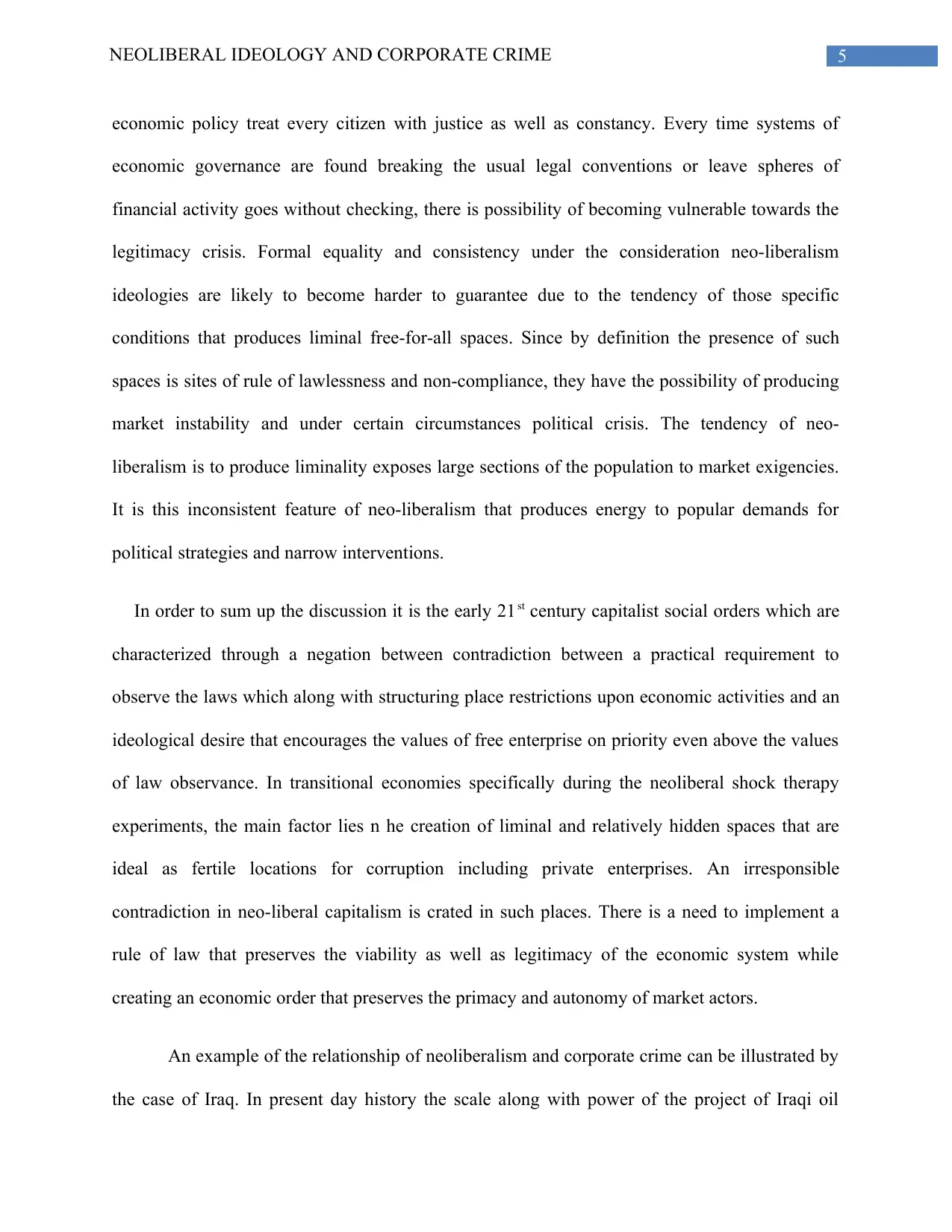
5NEOLIBERAL IDEOLOGY AND CORPORATE CRIME
economic policy treat every citizen with justice as well as constancy. Every time systems of
economic governance are found breaking the usual legal conventions or leave spheres of
financial activity goes without checking, there is possibility of becoming vulnerable towards the
legitimacy crisis. Formal equality and consistency under the consideration neo-liberalism
ideologies are likely to become harder to guarantee due to the tendency of those specific
conditions that produces liminal free-for-all spaces. Since by definition the presence of such
spaces is sites of rule of lawlessness and non-compliance, they have the possibility of producing
market instability and under certain circumstances political crisis. The tendency of neo-
liberalism is to produce liminality exposes large sections of the population to market exigencies.
It is this inconsistent feature of neo-liberalism that produces energy to popular demands for
political strategies and narrow interventions.
In order to sum up the discussion it is the early 21st century capitalist social orders which are
characterized through a negation between contradiction between a practical requirement to
observe the laws which along with structuring place restrictions upon economic activities and an
ideological desire that encourages the values of free enterprise on priority even above the values
of law observance. In transitional economies specifically during the neoliberal shock therapy
experiments, the main factor lies n he creation of liminal and relatively hidden spaces that are
ideal as fertile locations for corruption including private enterprises. An irresponsible
contradiction in neo-liberal capitalism is crated in such places. There is a need to implement a
rule of law that preserves the viability as well as legitimacy of the economic system while
creating an economic order that preserves the primacy and autonomy of market actors.
An example of the relationship of neoliberalism and corporate crime can be illustrated by
the case of Iraq. In present day history the scale along with power of the project of Iraqi oil
economic policy treat every citizen with justice as well as constancy. Every time systems of
economic governance are found breaking the usual legal conventions or leave spheres of
financial activity goes without checking, there is possibility of becoming vulnerable towards the
legitimacy crisis. Formal equality and consistency under the consideration neo-liberalism
ideologies are likely to become harder to guarantee due to the tendency of those specific
conditions that produces liminal free-for-all spaces. Since by definition the presence of such
spaces is sites of rule of lawlessness and non-compliance, they have the possibility of producing
market instability and under certain circumstances political crisis. The tendency of neo-
liberalism is to produce liminality exposes large sections of the population to market exigencies.
It is this inconsistent feature of neo-liberalism that produces energy to popular demands for
political strategies and narrow interventions.
In order to sum up the discussion it is the early 21st century capitalist social orders which are
characterized through a negation between contradiction between a practical requirement to
observe the laws which along with structuring place restrictions upon economic activities and an
ideological desire that encourages the values of free enterprise on priority even above the values
of law observance. In transitional economies specifically during the neoliberal shock therapy
experiments, the main factor lies n he creation of liminal and relatively hidden spaces that are
ideal as fertile locations for corruption including private enterprises. An irresponsible
contradiction in neo-liberal capitalism is crated in such places. There is a need to implement a
rule of law that preserves the viability as well as legitimacy of the economic system while
creating an economic order that preserves the primacy and autonomy of market actors.
An example of the relationship of neoliberalism and corporate crime can be illustrated by
the case of Iraq. In present day history the scale along with power of the project of Iraqi oil
⊘ This is a preview!⊘
Do you want full access?
Subscribe today to unlock all pages.

Trusted by 1+ million students worldwide
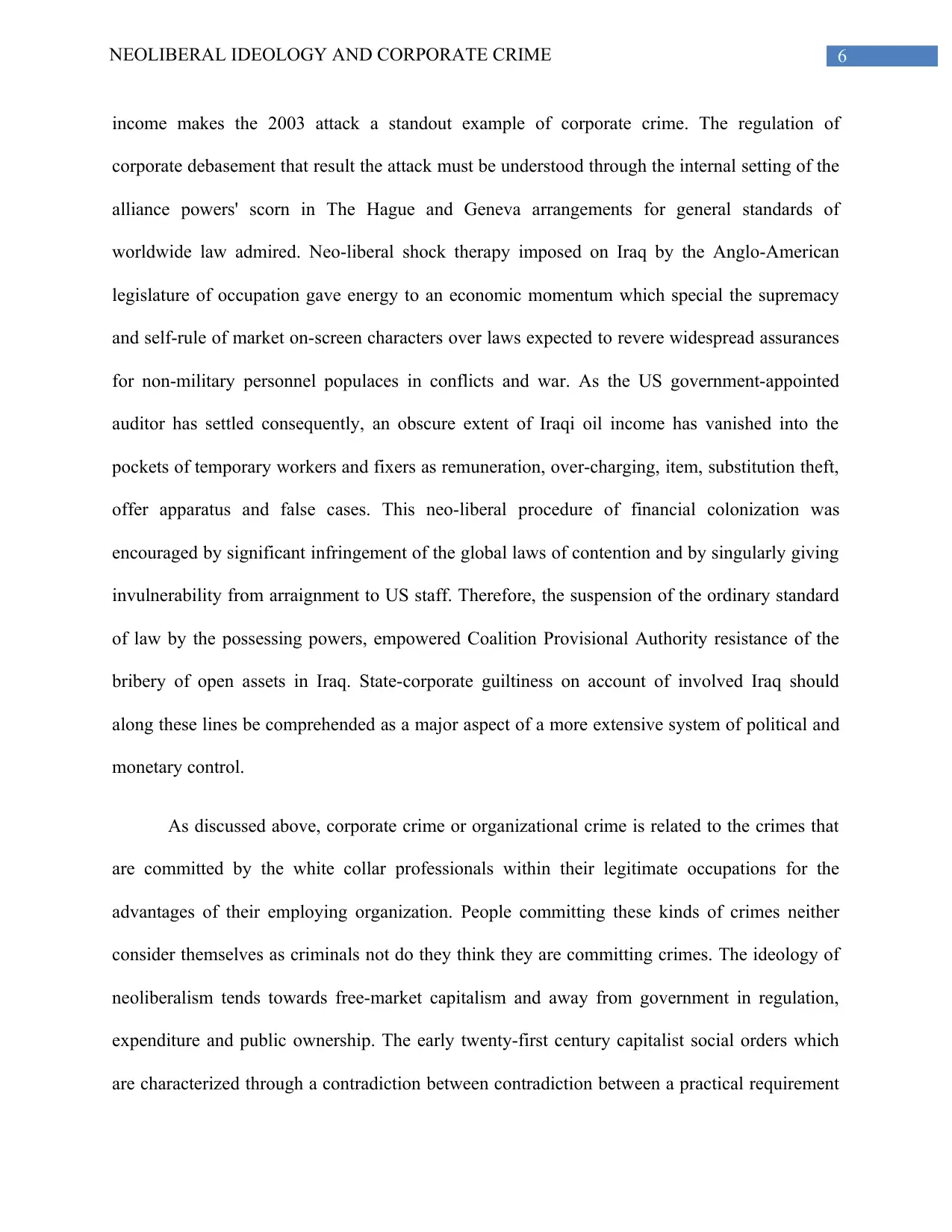
6NEOLIBERAL IDEOLOGY AND CORPORATE CRIME
income makes the 2003 attack a standout example of corporate crime. The regulation of
corporate debasement that result the attack must be understood through the internal setting of the
alliance powers' scorn in The Hague and Geneva arrangements for general standards of
worldwide law admired. Neo-liberal shock therapy imposed on Iraq by the Anglo-American
legislature of occupation gave energy to an economic momentum which special the supremacy
and self-rule of market on-screen characters over laws expected to revere widespread assurances
for non-military personnel populaces in conflicts and war. As the US government-appointed
auditor has settled consequently, an obscure extent of Iraqi oil income has vanished into the
pockets of temporary workers and fixers as remuneration, over-charging, item, substitution theft,
offer apparatus and false cases. This neo-liberal procedure of financial colonization was
encouraged by significant infringement of the global laws of contention and by singularly giving
invulnerability from arraignment to US staff. Therefore, the suspension of the ordinary standard
of law by the possessing powers, empowered Coalition Provisional Authority resistance of the
bribery of open assets in Iraq. State-corporate guiltiness on account of involved Iraq should
along these lines be comprehended as a major aspect of a more extensive system of political and
monetary control.
As discussed above, corporate crime or organizational crime is related to the crimes that
are committed by the white collar professionals within their legitimate occupations for the
advantages of their employing organization. People committing these kinds of crimes neither
consider themselves as criminals not do they think they are committing crimes. The ideology of
neoliberalism tends towards free-market capitalism and away from government in regulation,
expenditure and public ownership. The early twenty-first century capitalist social orders which
are characterized through a contradiction between contradiction between a practical requirement
income makes the 2003 attack a standout example of corporate crime. The regulation of
corporate debasement that result the attack must be understood through the internal setting of the
alliance powers' scorn in The Hague and Geneva arrangements for general standards of
worldwide law admired. Neo-liberal shock therapy imposed on Iraq by the Anglo-American
legislature of occupation gave energy to an economic momentum which special the supremacy
and self-rule of market on-screen characters over laws expected to revere widespread assurances
for non-military personnel populaces in conflicts and war. As the US government-appointed
auditor has settled consequently, an obscure extent of Iraqi oil income has vanished into the
pockets of temporary workers and fixers as remuneration, over-charging, item, substitution theft,
offer apparatus and false cases. This neo-liberal procedure of financial colonization was
encouraged by significant infringement of the global laws of contention and by singularly giving
invulnerability from arraignment to US staff. Therefore, the suspension of the ordinary standard
of law by the possessing powers, empowered Coalition Provisional Authority resistance of the
bribery of open assets in Iraq. State-corporate guiltiness on account of involved Iraq should
along these lines be comprehended as a major aspect of a more extensive system of political and
monetary control.
As discussed above, corporate crime or organizational crime is related to the crimes that
are committed by the white collar professionals within their legitimate occupations for the
advantages of their employing organization. People committing these kinds of crimes neither
consider themselves as criminals not do they think they are committing crimes. The ideology of
neoliberalism tends towards free-market capitalism and away from government in regulation,
expenditure and public ownership. The early twenty-first century capitalist social orders which
are characterized through a contradiction between contradiction between a practical requirement
Paraphrase This Document
Need a fresh take? Get an instant paraphrase of this document with our AI Paraphraser
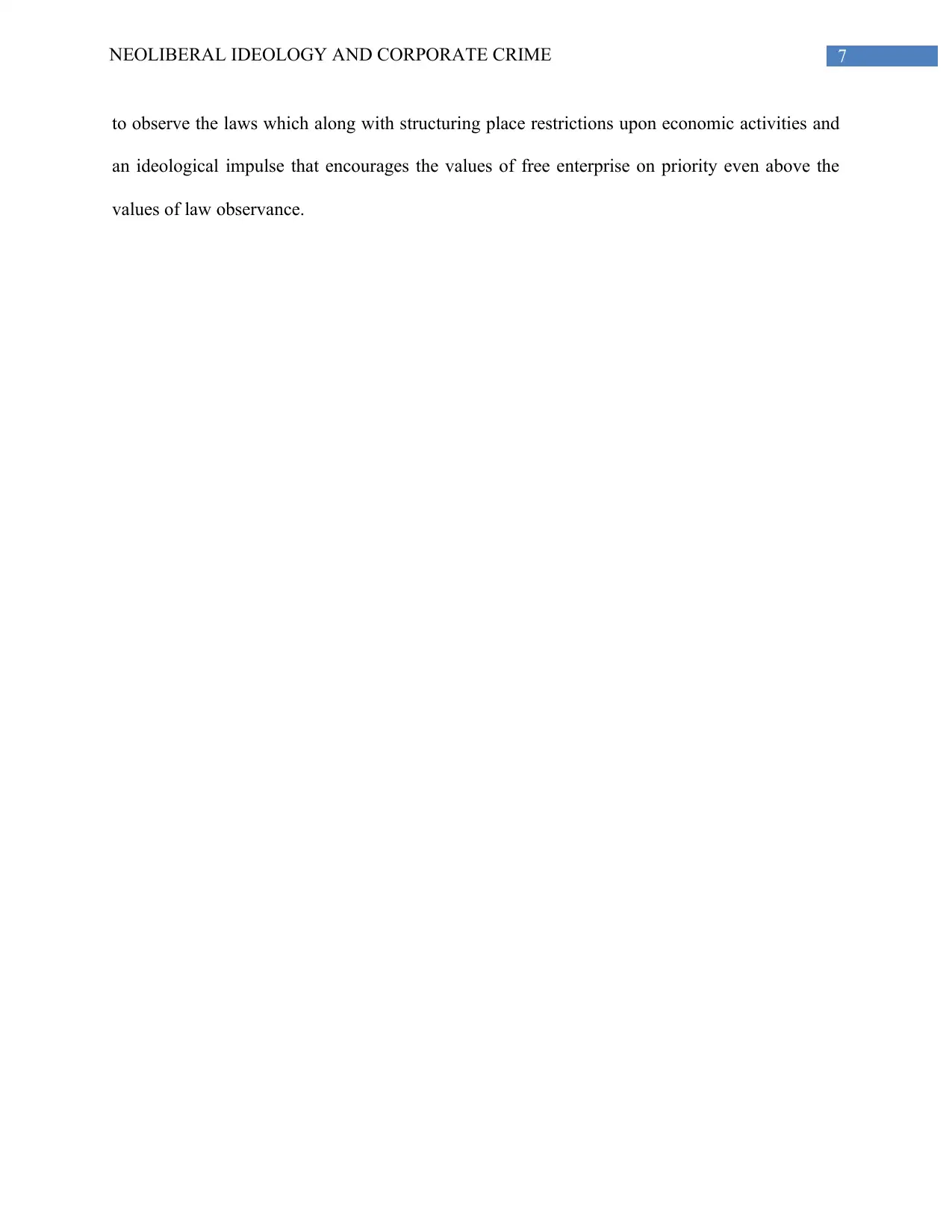
7NEOLIBERAL IDEOLOGY AND CORPORATE CRIME
to observe the laws which along with structuring place restrictions upon economic activities and
an ideological impulse that encourages the values of free enterprise on priority even above the
values of law observance.
to observe the laws which along with structuring place restrictions upon economic activities and
an ideological impulse that encourages the values of free enterprise on priority even above the
values of law observance.
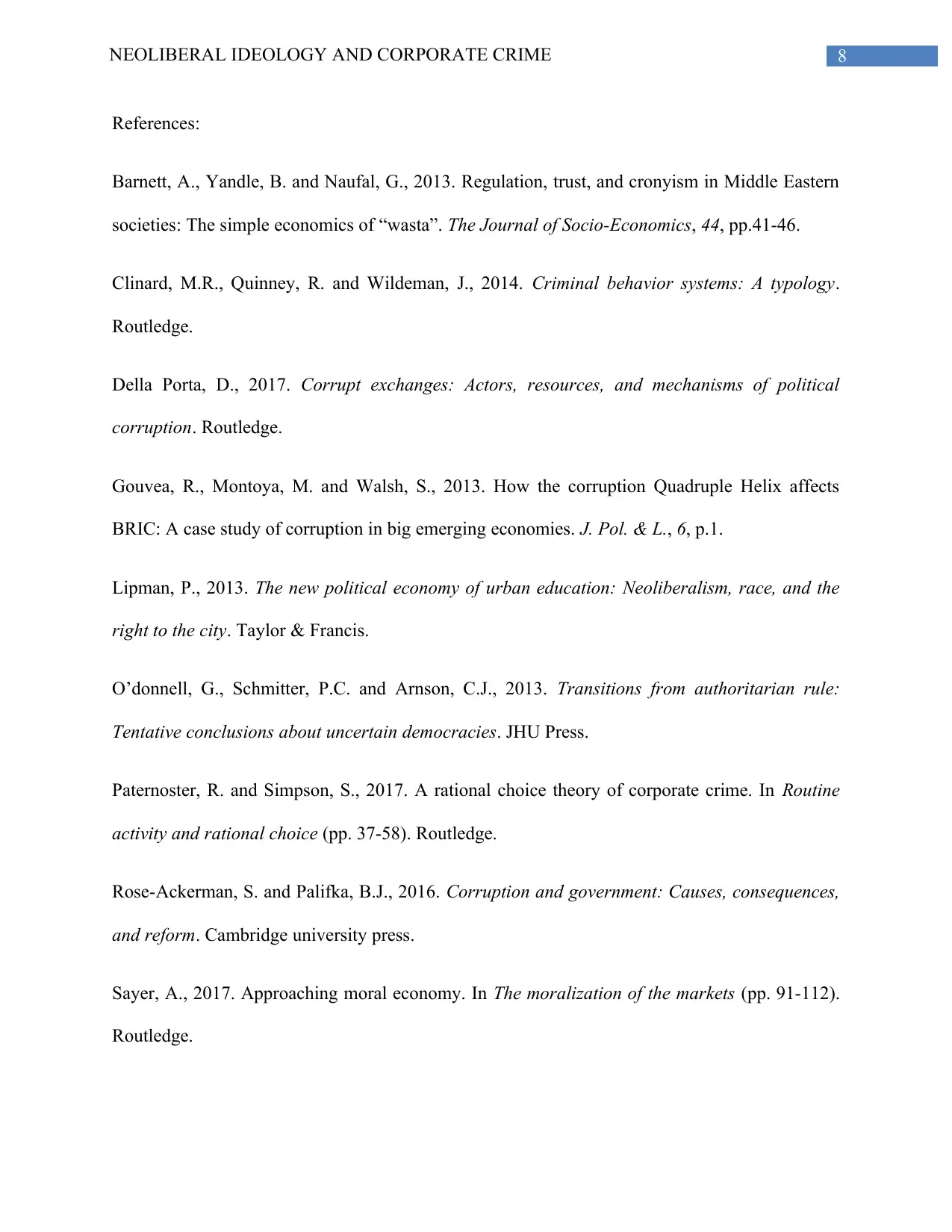
8NEOLIBERAL IDEOLOGY AND CORPORATE CRIME
References:
Barnett, A., Yandle, B. and Naufal, G., 2013. Regulation, trust, and cronyism in Middle Eastern
societies: The simple economics of “wasta”. The Journal of Socio-Economics, 44, pp.41-46.
Clinard, M.R., Quinney, R. and Wildeman, J., 2014. Criminal behavior systems: A typology.
Routledge.
Della Porta, D., 2017. Corrupt exchanges: Actors, resources, and mechanisms of political
corruption. Routledge.
Gouvea, R., Montoya, M. and Walsh, S., 2013. How the corruption Quadruple Helix affects
BRIC: A case study of corruption in big emerging economies. J. Pol. & L., 6, p.1.
Lipman, P., 2013. The new political economy of urban education: Neoliberalism, race, and the
right to the city. Taylor & Francis.
O’donnell, G., Schmitter, P.C. and Arnson, C.J., 2013. Transitions from authoritarian rule:
Tentative conclusions about uncertain democracies. JHU Press.
Paternoster, R. and Simpson, S., 2017. A rational choice theory of corporate crime. In Routine
activity and rational choice (pp. 37-58). Routledge.
Rose-Ackerman, S. and Palifka, B.J., 2016. Corruption and government: Causes, consequences,
and reform. Cambridge university press.
Sayer, A., 2017. Approaching moral economy. In The moralization of the markets (pp. 91-112).
Routledge.
References:
Barnett, A., Yandle, B. and Naufal, G., 2013. Regulation, trust, and cronyism in Middle Eastern
societies: The simple economics of “wasta”. The Journal of Socio-Economics, 44, pp.41-46.
Clinard, M.R., Quinney, R. and Wildeman, J., 2014. Criminal behavior systems: A typology.
Routledge.
Della Porta, D., 2017. Corrupt exchanges: Actors, resources, and mechanisms of political
corruption. Routledge.
Gouvea, R., Montoya, M. and Walsh, S., 2013. How the corruption Quadruple Helix affects
BRIC: A case study of corruption in big emerging economies. J. Pol. & L., 6, p.1.
Lipman, P., 2013. The new political economy of urban education: Neoliberalism, race, and the
right to the city. Taylor & Francis.
O’donnell, G., Schmitter, P.C. and Arnson, C.J., 2013. Transitions from authoritarian rule:
Tentative conclusions about uncertain democracies. JHU Press.
Paternoster, R. and Simpson, S., 2017. A rational choice theory of corporate crime. In Routine
activity and rational choice (pp. 37-58). Routledge.
Rose-Ackerman, S. and Palifka, B.J., 2016. Corruption and government: Causes, consequences,
and reform. Cambridge university press.
Sayer, A., 2017. Approaching moral economy. In The moralization of the markets (pp. 91-112).
Routledge.
⊘ This is a preview!⊘
Do you want full access?
Subscribe today to unlock all pages.

Trusted by 1+ million students worldwide
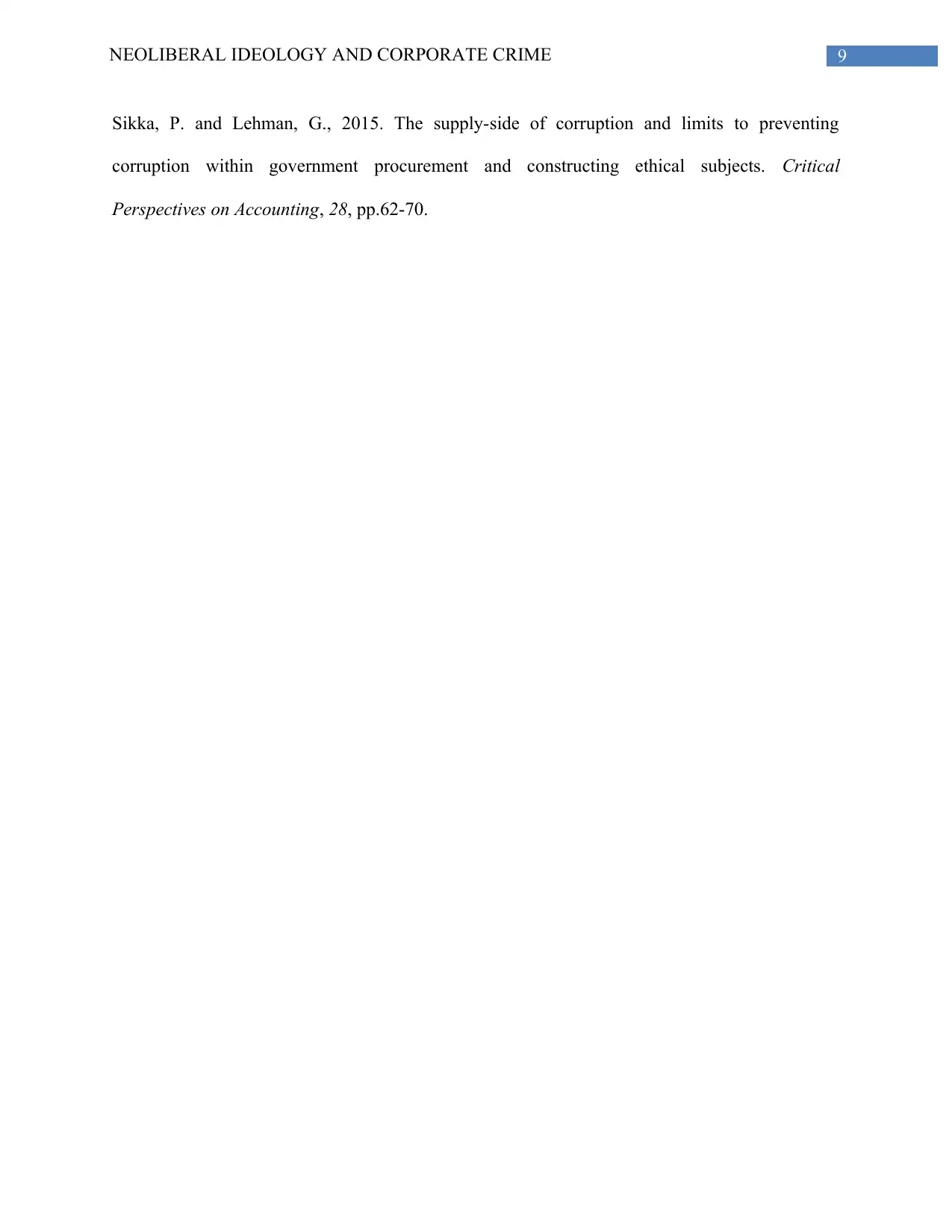
9NEOLIBERAL IDEOLOGY AND CORPORATE CRIME
Sikka, P. and Lehman, G., 2015. The supply-side of corruption and limits to preventing
corruption within government procurement and constructing ethical subjects. Critical
Perspectives on Accounting, 28, pp.62-70.
Sikka, P. and Lehman, G., 2015. The supply-side of corruption and limits to preventing
corruption within government procurement and constructing ethical subjects. Critical
Perspectives on Accounting, 28, pp.62-70.
1 out of 10
Related Documents
Your All-in-One AI-Powered Toolkit for Academic Success.
+13062052269
info@desklib.com
Available 24*7 on WhatsApp / Email
![[object Object]](/_next/static/media/star-bottom.7253800d.svg)
Unlock your academic potential
Copyright © 2020–2025 A2Z Services. All Rights Reserved. Developed and managed by ZUCOL.





